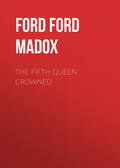
Форд Мэдокс Форд
The Feather
Suddenly a thought struck Ernalie.
‘Where are you going to take me?’ she asked as well as she could, for the wind blew her words down her throat.
The Goddess smiled somewhat maliciously, Ernalie thought, and checked the course of the stags that she might speak with greater ease.
‘You shall see,’ she said.
‘But I should like to know beforehand.’
‘I only promised to take you back to the earth,’ said Diana.
‘But you promised to do me no harm,’ said Ernalie dismally, ‘and if you leave me in the middle of a desert you’ll do me a lot of harm.’
‘But I’m not going to put you down into the middle of a desert,’ said Diana. ‘Look, we are descending. Now, see if you recognise the country you pass over.’
The Princess looked over the edge of the chariot, and she saw that the stags were descending in great spiral curves, and at each curve the earth flew up nearer and nearer to meet them. As they got lower down Ernalie could see what was below more clearly, as if she had been looking through an opera glass, and was only just commencing to get the right focus. When they were quite close the Goddess stopped the descent of the chariot.
‘Now, do you recognise where you are?’ she asked.
But Ernalie shook her head.
‘I only see that we are over the tops of a range of mountains that have snow on their peaks,’ she said. ‘But I was never here before – that I am quite certain of.’
The Goddess shook the reins, and again the stags flew forward; but this time not so fast as they had gone before.
‘You have been here before,’ she said. ‘And at just this height, and at just this speed, only you were going in the opposite direction.’
‘Why,’ said Ernalie, ‘I must be in my own country. Oh, how cruel of you to take me away from my Prince, and you promised to do me no harm.’
‘I am doing you no harm,’ said the Goddess. ‘To prevent you marrying is not harm – it is good.’
But the Princess said:
‘No! no! it is harm. I would give anything to be back with him.’
‘Would you give your feather?’ said the Goddess eagerly.
‘No, not that,’ said the Princess.
‘I will give you anything you like for it,’ said the Goddess. ‘Anything – ’
But the Princess said scornfully:
‘Not so, Goddess. I will get back to my love in spite of you. If I can do nothing better I will pray to Venus and offer her the feather.’
The Goddess looked angrily at her, and it almost seemed as if her eyes shot fire.
‘If it were not for my promise,’ she said, ‘I would hurl you from the car; but as it is, I will put you safely down.’
But the Princess smiled in spite of herself.
‘Do you, then, hate Venus so much, great Goddess?’ she asked. ‘Well, you have really done me much good, and therefore I promise never to give the feather to any other goddess save you alone.’
Diana looked very much relieved; for, to tell the truth, the goddesses in those days were very jealous of one another, and Diana could not bear the thought that any one else should have the feather if she could not get it.
So for a few minutes she was silent; and then suddenly she drew in the stags.
‘I am going to set you down here,’ she said, and they plunged into the darkness below. For you must know that though they were high up, and the rays of the sun, still below the horizon, fell on them, yet, beneath them, everything was dark in the shadow of the mountains.
The chariot sank slowly until it rested on the ground, but it was still so dark that the Princess could see nothing.
‘Get out,’ said Diana; ‘you are quite safe here.’ And the Princess obeyed. ‘Now remember,’ the Goddess went on, ‘I have kept my promises. Remember to keep yours. Give the feather to no one except to me, unless I send Iris for it. To her alone give it, for she is the messenger of the goddesses.’
The Princess once more promised, and Diana shook the reins, and the chariot once more darted up through the air and out of the lower darkness into the sunlight, until it was so high that it vanished altogether from her sight.
So the Princess looked wearily down again, and the earth around her seemed doubly dark by contrast.
‘I wonder where on earth I am,’ she said, and then she took two or three steps forward, but she came against a stone parapet or wall, or something. ‘I wonder what this is,’ she said to herself. ‘I think I shall stop where I am till daylight; it won’t be very long now, and I’m safe here at any rate.’
So she leant on the wall and waited; but even though the dawn was near it seemed long in coming.
But presently over the mountains in the east a yellow light stole, changing the silence of darkness for the clamorous speech of light, and the river flowing placidly in front was turned to liquid gold with the yellow of the dawn, and a sense of yellow-fringed gray mist was on everything, and forms erstwhile veiled discovered themselves.
‘Why, wherever am I?’ said Ernalie, rubbing her eyes in astonishment. ‘I seem to have been here before! Yes, there’s the fountain and the rose-bushes, and – why, this must be the terrace of my father’s Palace! Just where I was when the eagle carried me off. I wonder if the swans are still here,’ and she walked to the other side of the terrace and looked over the marble parapet into the water.
‘Yes, there they are.’ And on the marble steps that led down to the water the swans were asleep, each on one leg, with its neck coiled up on its back, and head under its wing. On hearing the footsteps of the Princess one of them looked lazily up as if it had been waked too soon, and then it shook its head, yawned, put down its other leg and waddled slowly to the water, into which it jumped with a splash that woke the others up; and they followed dreamily, being unused to the chill of the water so early.
A cock crowed, and his challenge was answered from far and near, and woke up the sparrows, who came down to the fountain for a shower-bath in the sparkling spray. They were followed by the pigeons, who, after cooing a little, stretched their wings and circled away on their morning flight. So, by degrees, the world awoke as the day took a firmer grasp on the land and the light grew stronger.
‘I wish they’d open the doors and let me get in,’ the Princess said. But as yet there seemed no sign of any one waking up.
‘Ah, well,’ she said resignedly, ‘I’ve waited six years to come home – I suppose I can wait a few more hours.’
So she quietly walked to the rose-bushes and plucked one or two of the great red damask roses, and chafing the petals off between her hands, threw the handfuls of them at the swans, who hissed and snapped as the mass of red leaves fell over them. It was some time since they had been subjected to such treatment; however, they seemed to get used to it again pretty easily.
Thus the Princess managed to while away about half an hour, and then she noticed smoke coming out of one of the chimneys.
‘They must be up in the kitchen,’ she thought. ‘I’ll just go and knock at the door and get let in.’
Accordingly she went and knocked softly at the door, and an angry voice shouted out:
‘Come in, do! and don’t stand knocking there. I’ve got the King’s boots to black, and his eggs and bacon to cook, and I’ve only got three hours to do it in. I haven’t got time.’
So the Princess lifted the latch and walked in.
‘Is the King up, cook?’ she asked.
‘No, he’s not! lazy old man as he is,’ said the cook, looking up angrily. ‘But where are you? Come out from behind that door.’
‘Oh! I had forgotten,’ said the Princess.
She meant, of course, she had forgotten about the feather, but the cook didn’t know that.
‘You’d forgotten, had you?’ she exclaimed. ‘I’ll teach you to forget if I catch you!’
‘But you won’t, my dear cook,’ said the Princess sweetly.
‘You’ll catch it if you don’t look out!’ howled the cook, as she rose from the floor where she had been cleaning the boots, and in doing so she knocked over an enormous pot of liquid blacking.
‘That’s your doing!’ she cried, as she made a dash at the door.
But the Princess evaded her easily, and she ran outside fully expecting to find the invisible questioner there. But the Princess meanwhile walked through the kitchen and up the back-stairs to her own room.
The room was just as she had left it when she went away, except that the bed seemed to have grown rather small for her, or rather she had grown too large for the bed.
However, she went in, and locking the door, laid herself down on the bed, and soon dropped off to sleep; for, as you may imagine, she was rather tired, for she had not slept for nearly two days – that is, ever since she had first reached the moon.
It did not seem that she had slept three minutes before she was awakened by a tremendous noise below-stairs.
‘I wonder what that is,’ she said. ‘I think I’ll get up and see.’
And she went to the wash-hand stand to wash the sea-water off her face, but the soap, from long want of use, had cracked in all directions, and she had to content herself with the water that was in the jug. Then she brushed her hair, which was full of salt, and after that tried to brush the salt off her dress; for the sea-water had dried on it, and had left it shining all over with the salt. Before she had quite finished, however, the noise that had waked her sounded again. It seemed as if some one were running downstairs very hard.
So the Princess took her hat off, not wishing to be invisible any more, for a time at least, and then, opening the door, she walked quietly downstairs.
There seemed to be no one about, and except that a terrible hurly-burly proceeded from the whereabouts of the kitchen, one would never have told that any one in the whole house was awake.
However, just then the clock in the hall struck eight, and a page came rushing downstairs.
‘Breakfast! breakfast!’ he shouted, quite without noticing the Princess, and he almost passed her before he saw her; but she stopped him.
‘Where is the King?’ she said.
‘The King is in his counting – that is, I mean the breakfast-room. But you can’t see him.’
‘But I must,’ said the Princess.
‘Well, of course, if you must – ’
The Princess interrupted him.
‘Don’t you know who I am?’ she said.
‘No, I don’t; and I don’t want to,’ said the page. ‘Perhaps you’re the person who brings home the washing, or the kitchen-maid. If you are, I wouldn’t like to be in your shoes. The King is so jolly wild about his eggs and bacon being late that – ’
But the Princess didn’t wait to hear any more; she walked straight towards the door of the breakfast-room. At the door two guards were stationed; but as they were old and crusted – that is, trusted – they remembered the Princess, and only saluted with their swords, wishing her ‘good-morning’ – for they were far too well bred to express surprise or joy at sight of her. One of them opened the door for her, and said in a loud voice:
‘The Princess, your Majesty.’
The King was seated in a chair with his back to the door, and did not seem to hear what the man said. He only nodded, and did not look up from the papers he was reading.
So the Princess stole quietly up behind him, and put her fingers over his eyes – she always was rather irreverent.
‘Guess who I am,’ she said to the struggling monarch.
‘I won’t,’ he spluttered, for he was rather enraged.
‘Think a minute, papa,’ she said encouragingly.
‘I never should have thought of being assaulted in such a way,’ said the King, who had given up struggling, finding it no use.
So the Princess drew her hands away, and kissed him on the top of his bald head.
The King darted away out of the chair as soon as he was released, and that so violently that he fell right on to the floor in a sitting posture.
‘Why, who the – ’ he was beginning; but his eye happening to fall on Ernalie, he ejaculated:
‘Good gracious! How did you come here?’
‘I walked downstairs from my room to bid you good-morning, papa, and you recoiled when I touched you as if I were a snake, instead of your loving daughter. But wouldn’t you like me to help you up? It must be rather uncomfortable sitting there.’
‘Yes, I think it would be as well,’ the King said, after reflecting a moment. ‘I shouldn’t like any one to see me in such a posture – it’s rather undignified for a king.’
So the Princess bent over and began to help him up; but it was a labour of some time, for the King was rather stiff, and just as she had got him half up a page entered and announced the breakfast. It was the same page that had met the Princess on the staircase, and when he saw the Princess assisting the King to rise, he rushed forward, shouting:
‘Help! help! She’s murdering the King.’
And catching the Princess by the arm, he pulled her away so roughly that she had to let go of the King, who recoiled at the shock, and rolled under the table on his back.
Alarmed at the page’s cries for help, a large number of people had rushed in, and he turned to them expecting to be commended for his bravery; but he saw that every one either looked as if he had put his foot in it, or else was trying hard not to laugh. The Princess herself could hardly help laughing at his perplexed face.
‘I think, sir, you were a little too vigorous in your help,’ she said coldly. ‘You may leave us now.’
‘And you can all go,’ said the King from under the table.
The whole lot trooped out, shutting the door, and as soon as they were outside shouts of laughter filled the air for some minutes.
The King meanwhile scrambled out from under the table and got up, this time declining his daughter’s help.
‘It’s always the way,’ he said, as soon as the laughter had died away. ‘Whenever I do anything ridiculous and undignified there’s always a lot of people to see it. Why, only last Thursday – no, last Tuesday, I think – anyhow, it was the day of the last state banquet, my crown tumbled into the soup-tureen, and then I was so nervous that, when I was raising my wine-glass to propose a toast, my hand shook so much that I dropped the wine down the Duchess of Carabas’s neck; and then she fainted, and I helped to carry her out of the room, and as soon as I got outside they all laughed so loud that the chandelier fell into the middle of them. It broke right on a duke’s head, and he never apologised for breaking it. However, I shall get over it now you’ve come back. We really must get into more regular habits. I’ve actually never had more than ten pages to serve my breakfast since you’ve been away, and, by the bye, we’ve not had breakfast; and I’ve forgotten altogether to have the bells rung in your honour. Just knock that gong there on the table – it’s cracked, but I can’t afford a new one, and it’s quite good enough for the guards outside to hear.’
So the Princess knocked the gong, and it certainly was cracked; it sounded a good deal more like knocking an old pot than a respectable royal gong.
At the sound one of the guards outside entered and saluted.
‘Let the breakfast be brought,’ the King said.
The guard withdrew, and presently the door opened, and a page appeared with the royal coffee-pot on a cushion of cloth of gold. Next came another page with the cream-jug on a similar cushion, and then another with the slop-basin, and another with the sugar, and another with the tongs, until the table was completely furnished. Last of all came, with a loud fanfare of trumpets, four men, staggering under the weight of an enormous silver dish with an equally enormous silver cover. When this was placed on the table, amid another flourish of trumpets, the royal butler entered, and said:
‘Breakfast is served, your Majesty,’ although the King could see it very well himself. But that was the custom.
‘You may remove the cover,’ the King said.
And the butler did so, discovering the breakfast. I say discovering, for the breakfast was so small that it seemed almost lost in the centre of the great dish. The twelve pages had ranged themselves in lines of six on each side of the table, and although they were very well bred, on the whole they could not help smiling, whereupon all simultaneously drew out their handkerchiefs and began to cough, and then they looked at the windows, as if to see where the draught came from.
But the King did not take any notice, and as soon as he could make himself heard, he said:
‘Ah! and what is this?’
‘It is the breakfast, your Majesty,’ said the butler.
‘Yes, I can see that,’ said the King. ‘But what is the dish called?’
‘Oh, the dish, your Majesty,’ said the butler apologetically. ‘It’s the ordinary silver dish that your Majesty has with the breakfast. I think it’s the fiddle pattern – no, that’s for spoons; but – ’
‘You’re an ass,’ said the King, interrupting him angrily.
‘Thank you, your Majesty. Anything else?’
‘Send for the cook.’
‘Yes, your Majesty. Anything else?’
‘Yes; go away, and don’t come back.’
‘Yes, your Majesty. You’re quite sure there’s nothing – ’
‘If you don’t go,’ said the King threateningly. But he had gone.
In a few minutes heavy footsteps were heard outside, and the door burst open violently, and a very fat person entered. She seemed a perfect mass of blacking and dust.
‘Who are you?’ said the King in astonishment.
‘I am the lady that does the cooking for you,’ said the cook solemnly.
‘Oh, you are,’ said the King; ‘and will your ladyship allow me to ask what that is?’ and he pointed to the breakfast.
The cook went forward and, taking a fork from the table, tried to pick the breakfast up, but it slid off the fork; so, without more ado, she took it up in her fingers and examined it carefully, as if to see that it had not changed since she sent it up. When she had done, she looked up and said:
‘Why, it’s as nice an egg as can be bought for money, only it’s a bit addled; and I dropped it in the blacking, but I wiped it on my own apron – look there.’
And she lifted up her apron to look at; and it certainly looked as if a good many eggs had been wiped on it.
However, the King did not notice that.
‘Oh, it’s an egg, is it?’ he said; ‘I didn’t know. I thought it was a piece of coal, and – ’
But at this point the cook broke in.
‘Call my eggs a coal! It’s a crying shame! You ought to be ashamed of yourself, an old man like you, too. Here have I been working for three hours this very morning at that egg, and he calls it a coal; and me that plagued too with demons! Why, only this morning one of ’em came and banged at the door so hard that it broke, and then it came in. It was a blue one, with red eyes and a long green tail with a fork at the end; and it stuck the fork in the egg, and then put the egg in the blacking and threw it all over the kitchen; and then it kicked the blacking pot over and flew out at the door before I could say “Gemini”; and I saw it with my own eyes, and it was as ugly a little – ’
But this was more than the Princess could stand.
‘Oh, what a – an untruth that is! Look at me. Am I a blue demon with red eyes and a tail?’
But the cook was off again.
‘Oh, it was you, was it? And you ought to be ashamed of yourself, a-frightening a poor lone-lorn woman. Call yourself a Princess? I call you a – ’
This was too much for the King.
‘That is enough,’ he said. ‘Take a month’s warning.’
To which the cook replied contemptuously:
‘You give me a month’s warning? Not a bit of it. I give you a minute’s warning! it’s quite enough for the likes of you.’
‘Oh, very well,’ said the King. ‘Of course, if you go off without warning, I don’t pay your month’s wages.’
‘Call yourself a King?’ roared the cook. ‘Why, you’re meaner than – ’
‘I don’t know what I call myself,’ said the King mildly, ‘but if you don’t go I’ll call a policeman and have your head cut off instead of your wages.’
But the cook was not to be daunted.
‘That’s what the likes of you does with your old and faithful servants. Here have I been, day in, day out, work, work, work, like a nigger slave-driver, and this is my reward!’
The King did not listen to the rest. He beckoned to one of the pages and said:
‘Just run and bring a sack and throw it over her head. Be quick!’
The page left the room.
‘There you go,’ said the irrepressible cook. ‘That’s it, send for the police, ye oppressors of the poor. Ugh!’
And she began a fresh volley of abuse. She seemed as if she would never lose her breath. But after a few minutes – it seemed ages to the unfortunate King – the page returned; and although he did not enter very quietly, yet the cook was making such a noise that she did not hear him, and the page, who seemed to enter entirely into the spirit of the thing, dropped the sack quietly over her head, and stopped her flow of language.
‘Now, take her outside and put her out at the back door, and mind and shut the door securely after her,’ remarked the King, with a sigh of relief.
Six of the pages immediately caught hold of her and dragged her out, and the other six were about to follow to see the sport when the King stopped them.
‘Can any one of you cook at all?’ he said.
One of the pages stood out and professed to be able to do a little in that way.
‘Well, then,’ said the King decidedly, ‘all six of you go to the kitchen and see what you can find there; and mind you, if I don’t have a breakfast in five minutes, I’ll – well, I’ll see about it.’
When the pages had gone, he turned to the Princess and said:
‘That’s what I always have to put up with. Only the other day the man who cleans the library windows flung his towel in my face and refused to work any more for me, and all because I told him that his coat wasn’t in the fashion.’
‘But wasn’t that rather an unwise proceeding, papa?’ asked Ernalie, dubiously.
‘Do you think so?’ asked the King. ‘If I said that the cut of your dress was rather outlandish – and it is, by the bye – you wouldn’t fling something at me, would you?’
‘No; but then I’m your dutiful daughter, you see.’
‘Well, but he ought to be my dutiful son, for I’m the father of my country.’
‘Well, but then, you see, sons are not always dutiful – daughters always are.’
‘Or they ought to be,’ said his Majesty.
‘It’s the same thing, isn’t it?’
‘Do you think so?’ said the King, in a tone that showed he doubted it.
Just at this moment the pages entered, bringing the breakfast; and they sat down to it.
I needn’t say it was much better than the first one, although I don’t remember exactly what it consisted of; however, they did good justice to it, for Ernalie was rather hungry.
Just as they had finished, the King threw down his knife and fork and looked as if he had just remembered something dreadful.
‘What is the matter, papa?’ asked the Princess in alarm.
And the King burst out:
‘There, now! I knew I’d forgotten something!’ he said. ‘Run out, all six of you,’ he went on, addressing the pages, ‘and set the joy-bells pealing, and send messengers throughout the land. Quick!’
But when they had gone, he calmed down and said:
‘Now, Ernalie, tell me where you’ve been.’
So she began and told it all through, and the King listened quietly till she had finished. Then he said:
‘Ah! You’ve had some wonderful adventures, and you’ve come back safe out of them – only, I should very much like to see this wonderful feather.’
So the Princess showed him the feather in her hat, which she had laid on a chair; the King looked at it very carefully, and then he said:
‘H’m. Looks a very ordinary feather. How does it work? I should like to see.’
‘You won’t see much,’ said the Princess with a smile, as she put it on and vanished.
The King looked astonished.
‘Why, where are you?’ he said.
‘I’m just where I was before, papa,’ answered the Princess.
‘But I don’t believe it,’ the King said, and he looked under the table. ‘You’ve hidden yourself behind something – or some other trick.’
He was rather too startled to think of what his words meant exactly.
‘You are a sceptical old papa for any one to have to do with; but I’ll soon prove it to you.’
And she walked quietly behind his chair, and blew in his ear, which was a rather rude thing to do, on the whole.
‘Perhaps that will blow the disbelief out of your head,’ she said, laughing to see how her unfortunate father shook his head in surprise.
‘Oh yes,’ he replied, ‘I’m quite convinced, and I don’t need any more; and I’d much rather see what you’re up to, so just take the feather off, there’s a good girl.’
And the Princess did as she was told, and the King said:
‘Ah! there you are. Don’t put it on again; I’ve had quite enough of it. Now I can understand how it was that you did it all. But I can’t understand why you didn’t let the young man save himself. You might just as well have lent him the feather, and let him go and get drowned.’
‘But I didn’t want him to get drowned,’ said the Princess.
‘Why not?’ said the King.
‘Because his father and mother took me in, and saved me from Wopole, and it wouldn’t have been a great return for their kindness to let their only son be killed, and besides I – ’ But her Royal Highness stopped.
‘You what?’ said her father.
‘I mean he – ’ and she stopped again.
‘Oh, it’s him this time, is it? What’s the matter with you?’ he said in astonishment. ‘You don’t mean to say that you’re in love with one another? Now I call that too bad. Here have I promised you to three dukes, and you’ve gone and fallen in love with a Prince. Now I shall have no end of a nuisance with them.’
‘I won’t marry them, at any rate,’ said Ernalie energetically.
‘I don’t want you to marry them– one’s quite enough at a time.’
‘But I won’t marry one of them, and I’m the principal person concerned.
And the Princess began to cry, and that of course softened the heart of her father.
‘There, there,’ he said, as if he were soothing a baby. ‘Don’t cry; you shall marry the Prince, if you can get him – only it’s rather awkward for me. I can’t tell the dukes that you’re engaged to a Prince that can’t be got at. I’m afraid the only thing to do will be to have all their heads cut off. That’ll keep them quiet, at any rate. If I were you I’d send this young man a letter to tell him where you are.’
‘But I’m afraid it wouldn’t reach him,’ said the Princess.
‘Then I don’t see what’s to be done,’ said the King perplexedly. ‘However, I shall give a grand ball to-morrow, and if I were you I should go and have a dress made at once. Send for the Court dressmaker, and tell her that if the dress isn’t ready by then you’ll turn her out of her place; and then when you’ve done that go into the library, and take a book and read. I’ve got a whole lot of work to do this morning; but I shall have finished by one, and then I shall have the day to myself.’
‘But can’t I stay with you while you work? I will be very quiet.’
But the King shook his head.
‘No – there’s a good girl. I’ve got a whole lot of people to give audience to, and they’ll take up such a lot of time congratulating you that I shall not get a stroke of work done.’
So the Princess went and was measured for her ball-dress, and then into the library, and looked about for a book.
Most of them looked very dry and uninteresting, so the Princess took one at a venture.
It was called The Canterbury Tales, by Geoffrey Chaucer.
‘Chaucer,’ said the Princess to herself, ‘I’ve heard of him. I’ll just take it on to the terrace and read it in the arbour. It’s better than sitting in this stuffy old library.’
So she opened one of the windows that led on to the steps of the terrace, and taking the book with her, stepped out of the room.
On the terrace a peacock was airing itself with some pea-hens, and when it saw the Princess it raised its great fan-like tail to display itself to greater advantage, then it quivered all over until the feathers of its tail rattled one against the other, and the hens looked admiringly at him, and then sideways at one another, nodding their heads and clucking, as if to say:
‘Ha! what a fine fellow our master is, and what a splendid tail he’s got. Much better than that poor human being’s yellow stuff, which only moves when the wind blows it.’ And then they looked contemptuously at the Princess’s golden hair, and clucked to each other again, and followed the peacock, which was strutting away to another part of the terrace.
So the Princess went and looked for the swans; but they were busily engaged right over at the other side of the lake, turning bottom upwards in a very undignified manner, and they refused to come for any amount of calling.
As there was nothing else to do, she went and sat down in a shady nook in the white marble wall, and began to look at her book.
‘I shall skip the “Introduction” and the “Prologue” – that’s always dry. Yes, let’s see, this will do – “The Knightes Tale.” It hasn’t got any apostrophe to “Knightes.” That’s bad grammar, I’m sure. However, I’ll go on.’
So she settled herself in a comfortable position with the book on her lap, and began again:
‘Whilom as olde stories tellen us
A certeyn duk highte Theseus.’
Here she stopped.
‘This man may be a good poet, but he spells awfully badly. Fancy “certain” spelt with an “e-y-n,” and “duke” without an “e.” It sounds like “duck.” And then, what was the “height of Theseus”? I can’t understand it at all.’
However, she read on, skipping pages here and there, for it was almost impossible for her to understand it. Now it happened that as she turned the pages over listlessly – for she was thinking of something else – her eye happened to fall on the name of ‘Dian.’
‘Why, that must be Diana! only they’ve forgotten the “a.” I’ll look a little farther and see what it says about her.’
So she ran her eye down the page, and sure enough she came upon the name.
‘Why, it’s spelt with a “y” now,’ she said. ‘Chaucer evidently doesn’t know his own mind in the matter of spelling. I’ll write to him, and ask him about it. Now, let’s see what it says. Why, it appears to be a prayer, or an invocation, or something.’
So she read:
‘O chaste goddes of the woodes greene
To whence bothe heven and erthe are seene
Queen of the regne of Pluto dark and lowe
Goddes of maydens that myn hert has knowe
Ful many a yeer ye woot what I desire
As keep me fro the vengeans of thilk yre
That Actæon aboughte trewely.’
Just at this point she heard the rattling of chariot wheels, and Diana appeared to her.
‘Well, what do you want now?’ she said.







